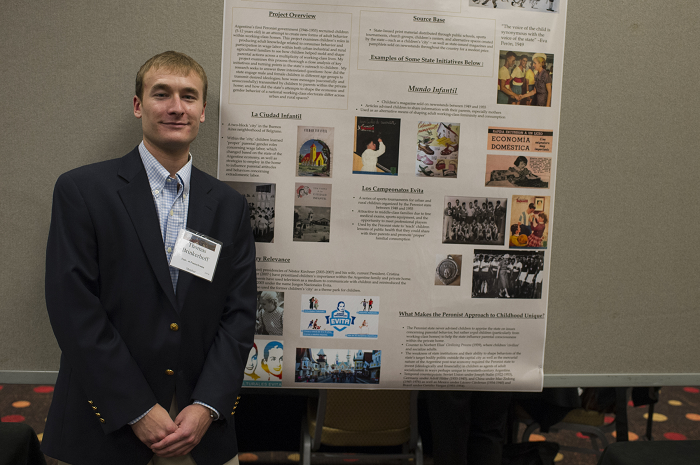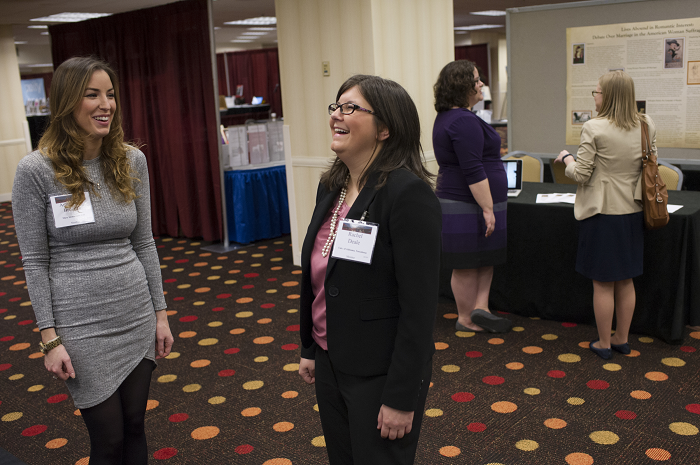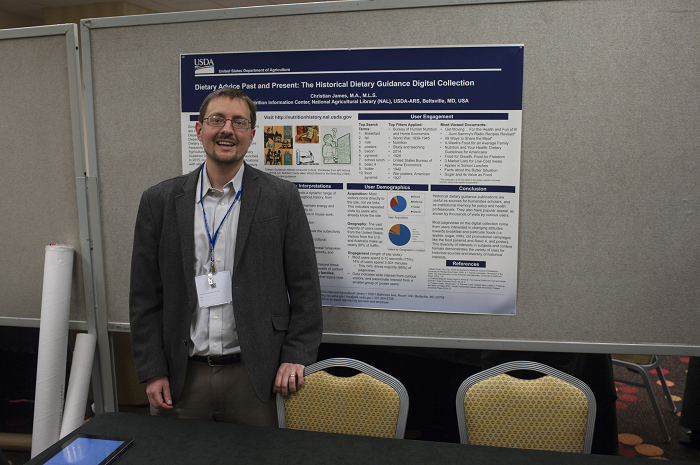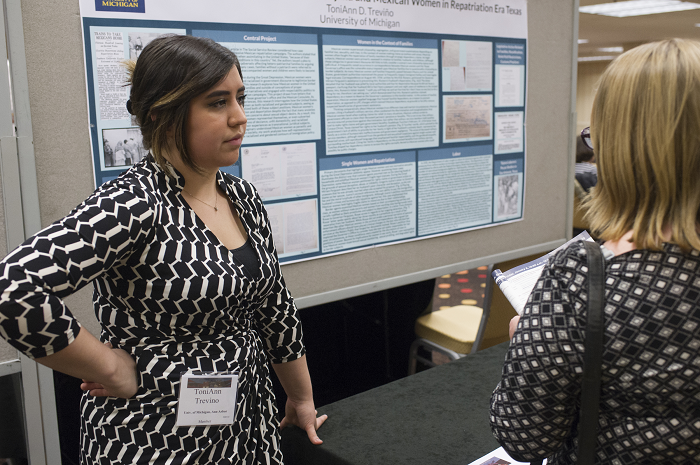Six degrees of separation. Dietary advice. Romance in the era of suffrage. For the scholars at Poster Session 3 of the AHA’s 130th annual meeting, these words were not tidbits of gossip, but ideas at the forefront of historical research. It’s no secret why participation in the annual meeting’s most interactive research format is growing every year. The poster session provides an accessible platform for the innovative and the unconventional. Here’s what happened when a spectator went table-hopping at this popular event.

Location, Location, Location
Lucy Barnhouse of Fordham University matched outfit to poster as she prepped her display on the socio-spatial location of hospitals in the late medieval Rhineland. As a first-time presenter, Barnhouse relished the opportunity to build skills in mapping and to present her research visually for an audience that extended far beyond her specialization. She'll soon delve deeper into medical history with an enticing new project: a survey of medieval medical recipes.

Evita’s Ephemera
Thomas Brinkerhoff jetted to Argentinian archives to retrieve the striking imagery—children’s readers, magazines, textbooks, and pamphlets—for his poster. This memorabilia incorporated children—“the only privileged Argentines,” according to first lady Eva Perón—into the political machinery of the Peronist party. The University of Pennsylvania graduate student used the materials to reveal how states produce knowledge to control consciousness. Brinkerhoff showed no signs of fatigue during his presentation, despite having a busy weekend as one of the newest and youngest participants in the Tuning project’s Workshop on Undergraduate Teaching.

Like Old Times?
AnneMarie Brosnan (left) and Rachel Deale shared a laugh as they took a quick break from their neighboring presentations. Both women’s research focused on understudied themes from Civil War and Reconstruction-era history. Brosnan, a PhD student from Ireland’s Mary Immaculate College, used North Carolina as a case study for analyzing textbooks found in southern freedmen’s schools from 1865 to 1876. Drawing heavily on her own background as a former schoolteacher, she demonstrated how a range of curricular materials depicted black Americans in profoundly racist ways.
The cornerstone of Deale’s poster was a bright map with a bold message. Illustrating the widespread locations of federal property seizures in the South from December 1860 to April 1861, the University of Alabama scholar argued that the Civil War began long before the firing on Fort Sumter. Previous scholarship, she contended, has ignored the capture of federal property and the erosion of federal authority in the South prior to the Sumter crisis.

No Vote, No Kiss!
For Jessica Derleth of Binghamton University, one poster could hardly contain the myriad images she’s uncovered on the effect of women’s suffrage on love and marriage. One Valentine’s card depicts a young girl telling a bashful boy, “I may look like a demure little miss, But this I’ll say, ‘No vote, no kiss.’” Derleth’s collection illustrated how suffragists responded to gendered attacks during their campaign for the vote. To counter claims that they were unfeminine or anti-marriage, suffragists hosted events such as “married couple’s days,” inviting supportive husbands to stand on stage with them at rallies.

Data-Rich and Famous
The University of Southern California’s Nicholas Gliserman drew a large crowd to his poster, which documented the process of creating a geodatabase from a data-rich 17th-century map of Quebec. Central to his work is “georectification,” a process by which computer software warps a historical map to fit a present-day map. What’s next? A geographic portrait of North America. Said Gliserman, “I’m going to take multiple maps and put them in the same geodatabase in order to cross-reference them.”

The New Fad Dietary Advice
Christian James came from a different background than many of the other poster presenters, working under a student fellowship at the National Agricultural Library. In response to popular and professional interest in food history, the library is collecting and digitizing publications on dietary advice into a single online tool, the Historical Dietary Guidance Digital Collection. James presented a brief history of federal dietary guidance and demonstrated the collection’s utility as a resource for further research and education.

Six Degrees of Kevin Bacon
Which inhabitants of early modern Britain would have “friended” one another? That’s exactly what Carnegie Mellon University’s Jessica Marie Otis sought to answer with “Six Degrees of Francis Bacon (SDFB),” a digital humanities project reconstructing the historical relationships of early modern Britain through a combination of statistical analysis of texts and crowdsourcing. Using the Oxford Dictionary of National Biography, Otis helped construct a preliminary social network website of over 13,000 early modern figures and 170,000 relationships. Next up is an “add-a-thon” event, which will bring contributors together to add more women to the network.

Dignity Prevails
Looking at Mexican American history through a gendered lens, the University of Michigan’s ToniAnn Treviño showed how Depression-era Mexican women in the United States conspired to forge rights claims during repatriation campaigns. The poster included visual sources such as letters submitted by Mexican women to the Texas governor’s office and maps that showed Border Patrol offices and Mexican consulate locations in relation to one another. Any plans to publish yet? Treviño replied, “I’m still trying to figure out how that works!”

This work is licensed under a Creative Commons Attribution-NonCommercial-NoDerivatives 4.0 International License. Attribution must provide author name, article title, Perspectives on History, date of publication, and a link to this page. This license applies only to the article, not to text or images used here by permission.
The American Historical Association welcomes comments in the discussion area below, at AHA Communities, and in letters to the editor. Please read our commenting and letters policy before submitting.
Tags: Annual Meeting 2016 Annual Meeting Resources for Graduate Students Scholarly Communication Graduate Education
Comment
Please read our commenting and letters policy before submitting.






